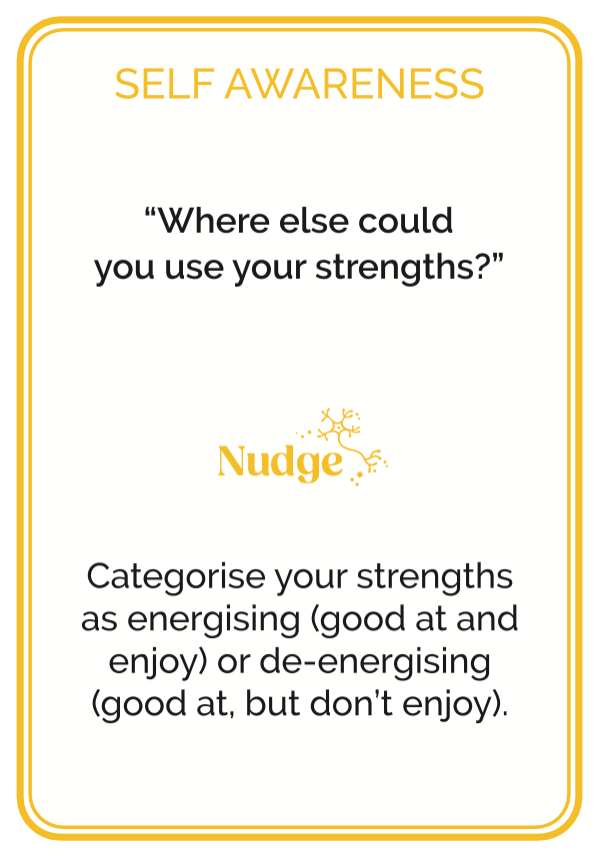Why Leaders Should Coach, Not Just Manage
Today’s best leaders don’t just direct and instruct—they coach. A Leader as Coach approach shifts leadership from giving advice to guiding reflection, problem-solving, and growth.
But let’s be honest, not all leaders have formal coaching training. That’s where Neuro Nudges coaching cards come in. These science-backed prompts help leaders ask better questions, encourage reflection, and support team development, without needing extensive coaching expertise.
Let’s explore how you can integrate Neuro Nudges coaching cards into your leadership conversations for greater engagement, performance, and resilience.
1. Build Self-Awareness for Stronger Leadership
Self-awareness is the foundation of leadership success. It enables team members to recognise their strengths, challenges, and decision-making approaches. Neuro Nudges help leaders foster insightful self-reflection in a structured, neuroscience-backed way.
🧠 Neuroscience Insight: Recognising and utilising personal strengths enhances wellbeing and reduces psychological distress, enabling employees to become more engaged and effective.
💡 How to Use:
Coaching Question: “What is a strength that you often overlook?”
Nudge: Encourage team members to seek feedback from colleagues or friends to uncover hidden strengths.
Leadership Impact: Employees become more self-aware, motivated, and confident in their abilities.
➡ Why it matters: Studies show that employees who understand their strengths perform better and feel more fulfilled at work.
2. Create Lasting Habits with Neuroscience Based Coaching
Leaders play a crucial role in helping their teams develop and sustain productive habits. Neuro Nudges leverage habit formation principles to make behavioural changes stick.
🧠 Neuroscience Insight:
Habit stacking: linking new behaviours to established habits can streamline the formation of new routines.
💡 How to Use:
Coaching Question: “What existing habits or routines could you anchor or ‘stack’ a new habit upon?”
Nudge: Identify current routines that can serve as triggers for new behaviours.
Leadership Impact: Employees build sustainable productivity habits instead of relying on short-term motivation.
➡ Why it matters: Research confirms that habit formation is key to long-term behavioural change, making coaching for habits a powerful leadership tool.
3. Strengthen Team Relationships for Better Collaboration
Strong relationships drive high-performing teams. Leaders can use Neuro Nudges to deepen connections, improve decision-making, and enhance psychological safety.
🧠 Neuroscience Insight:
Social connections are vital for overall health and wellbeing, directly affecting your brain and mental health. They've been identified as one of the key determinants of mental health and wellbeing, all of which is helpful for increased performance and motivation.
💡 How to Use:
Coaching Question: “Who helps you make decisions when you need to think through options and consequences?”
Nudge: Encourage team members to identify and actively engage with their support networks.
Leadership Impact: Employees feel more connected, confident, and supported, leading to better teamwork and collaboration.
➡ Why it matters: Studies show that teams with strong relationships and trust outperform those with weak social connections.
4. Enhance Motivation by Leveraging Brain Science
Motivation is more than external rewards—it’s about intrinsic drive and purpose. Leaders can use Neuro Nudges to help employees stay motivated, even through challenges.
🧠 Neuroscience Insight:
Understanding your values provides a clear compass for goal setting, ensuring alignment of your goal with your core beliefs. When goals are compatible with your values, you'll experience more motivation and perseverance, resulting in higher chances of achieving the goals.
💡 How to Use:
Coaching Question: “What positive emotions do you want to feel when you achieve your goal?"
Nudge: Help employees visualise their end goal and the emotions associated with success.
Leadership Impact: Employees feel more inspired, resilient, and committed.
➡ Why it matters: By broadening your perspectives, positive emotions encourage you to play, learn, gain knowledge and skills, and form relationships.
5. Build a Coaching Culture for Continuous Growth
Coaching doesn't need to be limited to one-on-one sessions—it can be woven into daily interactions. Neuro Nudges make it easy for leaders to embed coaching moments into meetings, team check-ins, and decision-making.
💡 How to Use:
Before a brainstorming session: Ask “What would be different if we approached this with a learning mindset?”
During a team meeting: Ask “Where else or how else could you use your strengths?”
This question encourages team members to think about their potential in new ways, aligning with the goal of fostering a coaching culture.
➡ Why it matters: Building a coaching culture helps teams develop critical thinking, problem solving, and resilience leading to sustained business success.
Final Thoughts: One Question Can Change Everything
Being a Leader as Coach isn’t about having all the answer, it’s about asking the right questions.
By integrating Neuro Nudges coaching cards, leaders can guide reflection, foster growth, and create a thriving, resilient team culture, all through brain-friendly, science-based coaching.
Want to be a more effective leader? Start by asking better questions and discover the coach within.
For more insights, follow us on Insta, Facebook or LinkedIn, or sign up for our monthly newsletter.
